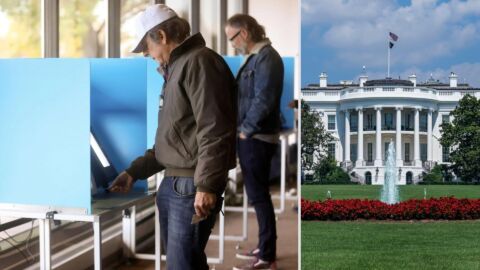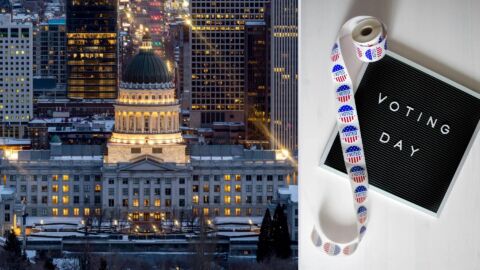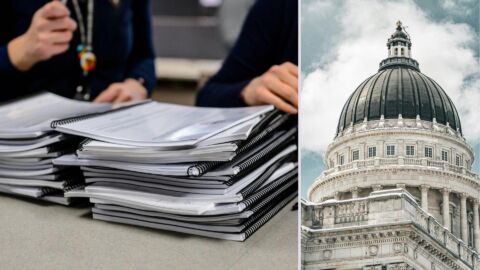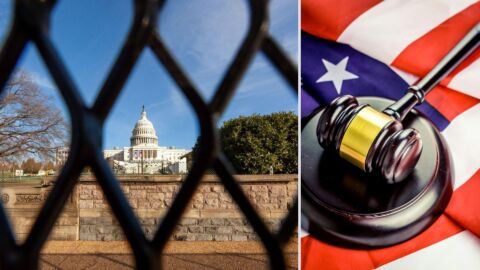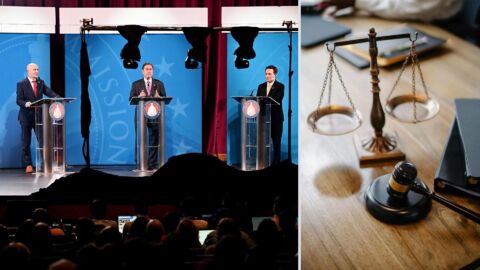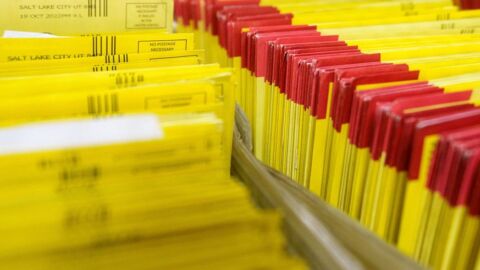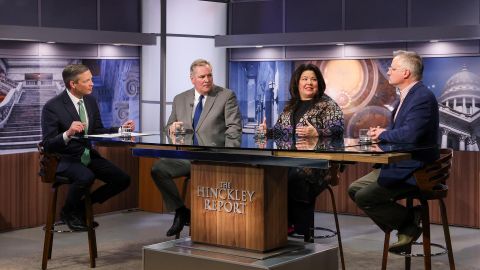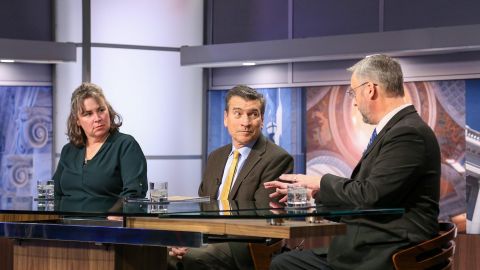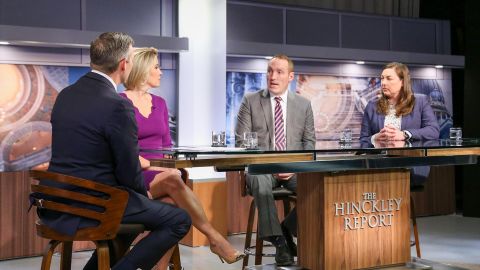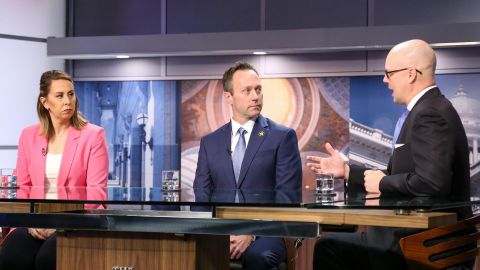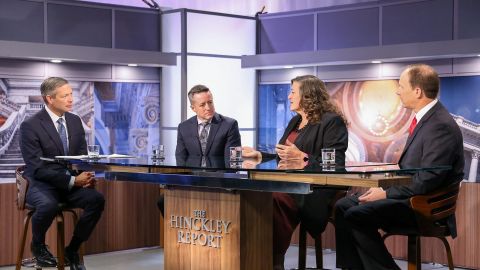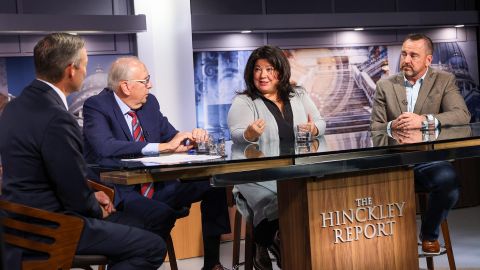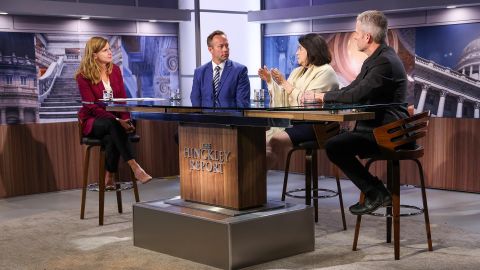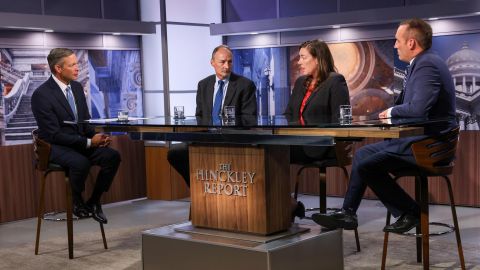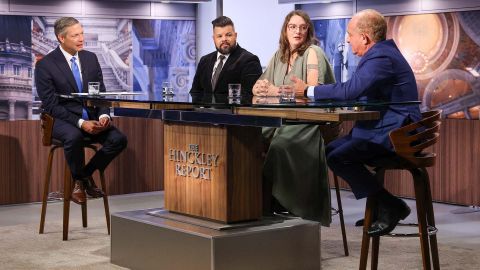announcer: Funding for "The Hinckley Report" is made possible in part by the Cleone Peterson Eccles Endowment Fund.
Jason Perry: Tonight on "The Hinckley Report."
The nation's eyes turn to Utah's special election as a razor thin margin separates the candidates.
Congress works to pass a budget as the federal government teeters on the brink of another shutdown.
And our expert panelists weigh in on the major political stories of the summer.
♪♪♪ ♪♪♪ Jason Perry: Good evening, and welcome to "The Hinckley Report."
I'm Jason Perry, Director of the Hinckley Institute of Politics.
Covering the week we have Boyd Matheson, host of "Sunday Edition" on KSL-TV; Lindsay Aerts, reporter with KSL NewsRadio; and Daniel Woodruff, reporter with KUTV 2 News.
So glad to have you here on the season premiere of "The Hinckley Report," and just in the nick of time because so much is happening in the political world, so much this summer, and so much to talk about today.
Glad to have you here with your expertise.
Boyd, I wanna start with the primary we just had in the state of Utah.
It was the Republican primary for a-- for the race, and the seat was vacated by Congressman Stewart.
He'll be officially resigning soon.
But we had this primary, let's break this down just a little bit because the results are interesting and instructive, not just now, but what might happen for candidates in the future.
As of the airing of the show, about a five point percentage margin separates Celeste Maloy as the winner in this.
In fact, concession speeches have already been had and given.
So, talk about this particularly through this lens, the urban-rural divide that may or may not exist, but it sure looks like it did.
Boyd Matheson: It looks like the rural vote really showed up and showed out in terms of this vote.
And I think it really was the difference for Celeste Maloy.
She did the hard work and heavy lifting of spending a lot of time in southern Utah.
She has a good base there.
And I think it does show that this district is shifting a little bit.
This will be the first time that we have had a representative not from the Wasatch Front, so I think that's an interesting thing if Celeste Maloy runs the table into November.
And so, I think that's an interesting message for rural voters.
I also think there was a real telling sign in terms of who really engaged with the public.
Short race, middle of the summer, vote the day after Labor Day, a lot of complicating factors.
I also think this was a big loss for the consulting class because I think they got it all wrong all the way along.
Jason Perry: Lindsay, talk about that for just a moment too, particularly that urban-rural divide.
Because for a very long time, rural Utah has been saying we need someone that represents us.
This district has urban and rural counties in it.
This was their moment, and it does appear that rural Utah made their voice be known.
Lindsay Aerts: Yeah, and when you look at whether it's the rural urban divide or redistricting or combination of both or how Celeste Malloy campaigned and how Becky Edwards campaigned, I think all of those things played a factor, because the district is now more rural than any other congressional district in the state thanks to redistricting.
It only includes two, and we'll call it 2.5 with Tooele, counties along the Wasatch Front, right?
Salt Lake, Davis, and Tooele.
And then the other 10 counties in the district are considered rural counties, although Washington County certainly has urban hubs, right, in Saint George.
But Celeste Maloy turned out like Boyd was saying in all of the rural and southern Utah counties.
And it's interesting to kind of piece out was this redistricting, was this the turnout?
Because we know that the turnout was higher in Washington and in rural Utah than it was in Salt Lake and Davis counties, even by a little bit.
And so, if Salt Lake and Davis counties had turned out more, could Becky Edwards have pulled this off?
Meanwhile, she needed to do better in southern Utah and rural Utah to bump up those numbers.
So, it's hard to say whether it's just redistricting, just the urban-rural turnout.
Certainly it's a combination of all of those.
Jason Perry: It does seem to be the case.
Daniel, one of the interesting aspects of this based on what Boyd was saying a moment too, this is a very compressed timeline.
Sometimes when you have a really short period of time to make your case be known, a lot of people default to name ID, and people in Utah had heard the name of Becky Edwards quite a bit.
Republican circles, Bruce Hough, Celeste, a little less, and she leaned hard on very high profile endorsements, including Congressman Stewart, who was with her to the very end.
Daniel Woodruff: Yeah, she had that endorsement, and she really made an effort to get her name out there, particularly in those rural counties.
I also want talk a little bit about the strategy that each candidate had, because throughout this very compressed timeline, you saw Celeste Maloy and Bruce Hough get together for a number of debates, they called them.
And one of them was hosted by Boyd with statewide reach.
Becky Edwards in the primary cycle did not debate.
Becky Edwards also did not grant media interviews.
It was really interesting to see almost an incumbent-like strategy of non-engagement with a lot of the traditional campaign-like things, going to do a media interview, or getting to take part in a debate.
And I wonder how much postmortem she and her campaign staff are having about that in the wake of her loss.
I also thought it was interesting being at Celeste Maloy's campaign watch party when the initial numbers came in, Becky Edwards had a very large lead from those urban counties, but one by one by one by one that narrowed down, and seeing the mood in that room by those folks, it was down in Cedar City, seeing southern Utah and rural Utah speaking in a way that ultimately pushed her over the top, it was an interesting place to be at for sure.
Boyd Matheson: The thing I was watching all along was will this very Washington D.C. based consulting style that Becky Edwards was clearly deploying, a lot of high level ads, very slick, very disconnected, if that was going to play, didn't show up to any of the debates.
And that's kind of the consulting class saying, "Look, don't engage on that.
You don't have to defend your record, your vote for President Biden."
You know, some of those things that I actually have heard Becky give really good answers to.
But I think the fact that they went with this very expensive, very high level-- Celeste Maloy spent about $70,000 compared to $300,000 plus for the Edwards and Hough campaigns, and so I think that was an interesting thing.
But to me that's the beauty of it, because I was worried that she was going-- that Becky Edwards would be able to show you really don't have to engage with voters.
You can treat people like fly-over counties, like we have fly-over states in the country, and this proved that it did matter that they showed up.
They had great debates in every county.
They had great discussions, they were out amongst the people, and to me that's good, that's good for the state, that's good for-- good for the country to have those kinds of conversations.
Lindsay Aerts: I wonder if the debate thing too is a little bit of pride on the Edwards campaign, because when Celeste Maloy came out with this debate schedule, she called it debates, and we all called it debates for lack of a better word, right?
That's what she called it.
They-- the campaign invited all the candidates to be there, Bruce said yes, Becky said no, chalked it up to going out to meet with voters, having those long form conversations, and it was a strategy.
But at the same time, I wonder if the Becky Edwards campaign was just like, listen, we're not giving Celeste the win on this.
We're not going to just participate in what they called campaign events, right?
And it proved not to be a winning strategy, but I kind of feel like the conversation has turned into, well, she didn't debate, she didn't show up.
But at the same time, I wonder if that was kind of a little bit of a pride thing of just-- Boyd Matheson: Compare and contrast is always so interesting to me.
I remember back in 2010, there were 49 debates before the primary for the Republican Senate seat.
And they had them everywhere.
The Elks Lodge, the library, any time.
And some days there were three debates in a day, but they were having real conversations, and that compare and contrast, and again, I think the Edwards campaign thought we already have name ID.
Let's not let anybody else develop it in the process.
But I think that's a big mistake.
I think voters have started to say, you know what?
I'm gonna lean in a little bit more.
I'm gonna ask harder questions.
And I'm gonna listen more, and I'm gonna see who shows up.
Because I think one of the great disconnects with voters across the country, and especially in Utah, is that disconnect, and they want someone who will show up, who will take the time to have those conversations.
Lindsay Aerts: To your point, Boyd, we're all talking about how Becky didn't debate as opposed to what actually happened at the debates, right?
So, not debating proved to be a thing.
Jason Perry: Well, Daniel, how did those debates play out in that rural Utah?
Because what they saw was a lot of Bruce Hough, a lot of Celeste Maloy.
So, I'm kind of curious how those two candidates right there kind of played against each other in terms of the votes from rural Utah.
Daniel Woodruff: Well, I think it ultimately did well for Celeste, and I mean, I remember talking to her, and I said, Where do you feel you're strongest base is?
And she said, "From Tooele south," and that's where a lot of those events happened.
And I think it ultimately played out for her.
And I mean, really there was a moment when she was live with me on election night, and it was the moment that Washington County put her over the top, and she just did a fist pump.
And it was interesting because earlier when the numbers were there with Becky with a big lead, they weren't discouraged.
They were still smiling and happy, and it was almost like she was saying, and I'm just speculating, but rural Utah, my strategy came through, and it's vindicated, it's vindicated.
I was able to beat the money, I was able to beat the name ID, I was able to beat all of these things that were stacked against me with the support of people from an area that she's familiar with.
She was born in Cedar City.
She lives there now and knows it well.
Lindsay Aerts: And Celeste told me the same thing when I talked to her late before election day.
She just believed that rural Utah could swing this vote.
She spent a lot of her time there, she focused there.
And I was at the Becky Edwards campaign on election night, there was so much excitement in that-- Daniel Woodruff: The mood started different, right?
Lindsay Aerts: Yeah, in that initial drop, and, ironically, they ended the night before the Washington County numbers came in.
Now, they said it was because they had to get out of the venue, right?
So we'll take them at their word, but there was not that Washington County came in and it was womp, womp.
So, there wasn't that mood, we left in a positive light, but there was very much excitement at the beginning when the numbers first came in, almost celebratory.
And obviously that didn't play out.
Jason Perry: Another interesting aspect of this, Boyd, is that we have the candidate that came out of the convention, which was Celeste Malloy.
And so, in Utah, we have seen, you know, some of the more conservative candidates come out of the convention and then more moderate candidates tend to be more successful.
That wasn't the case here.
How is-- how are you looking at that?
Based on what I think a lot of the conservative Republicans are saying, see, the system works.
Boyd Matheson: Yeah, and I think it's interesting that as you look at how the played out and really between the three candidates, neither Bruce nor Celeste nor Becky, you could say, is an extreme candidate.
None of them were really talking a whole lot about the former president Trump, Bruce Hough did a little in terms of poking at who voted for who.
But the vast majority of the conversation was around issues.
And I-- so I think the people who go to the caucus and the convention, they want to know the issues.
And so, I think Celeste did a good job there, but I think Celeste did a great job talking to voters who aren't in the middle of the caucus and convention system, but who that resonated with, say, oh, she actually knows about water, she actually knows about land, she actually understands the legislative process.
And so, I think that's why there was probably a little bit more of a balance there.
Jason Perry: Do you feel like people were actually talking about her being the delegate choice?
I mean, I didn't really hear that too much.
Lindsay Aerts: I didn't really hear that either, and I feel like it's less of a convention versus signature route as it more so is the makeup of the district and the turnout, right?
Daniel Woodruff: Down in Washington County, there was that discussion, because Bruce Hough put out a mailer that indicated that he was being endorsed by the Republican Party chair, and the Republicans down in Washington County got upset with that and said that's not fair.
And the Republican party chair had to say you're right, we're endorsing Celeste Maloy.
So, I think in some places it played a role, but not certainly everywhere.
Jason Perry: Okay, before we leave this in a little bit, just let's talk about turnout, because, Lindsay, you've been working on that too.
Where does it look like we're gonna be on voter turnout, particularly with the Republicans?
Lindsay Aerts: I think overall in the district, I think I have these numbers pretty right, but just correct me if I'm wrong.
I think we're in the high 30s, right?
Maybe we've reached 40% when all is said and done.
Jason Perry: We're about 40%.
Lindsay Aerts: Okay, right, about 40%, yeah.
Jason Perry: Which, interestingly, is exactly what we had in the special election in 2017.
Lindsay Aerts: Exactly, and we all talked about how different this race is, right?
There's really nothing to compare it to even in that special election with Jason Chaffetz back in 2017.
We hadn't moved the election dates, right?
So, they didn't move to where there was a major holiday right in the middle of turning in ballots.
And so, this election really is an anomaly, but again, I think it goes back to the combination of the turnout, the makeup of the district, and then Celeste campaigning with who makes up this district.
Jason Perry: One last thing, Daniel, because we now looking towards November.
Kathleen Riebe, and several others, but she's the Democrat challenger here, it appears that she's coming out swinging already.
Daniel Woodruff: In one particular way that stood out to me as I read her statement, congratulating Celeste on her win as well as she says congratulating her on coming back to the district.
So, Kathleen Riebe is going to try to play up the fact that Celeste Maloy lived back east, that she is not a true Utahn, someone that's lived in this district, she's gonna hammer that.
That was the part that stood out to me.
And it was a fiery statement on the heels of this campaign result.
Boyd Matheson: I think it was really disappointing.
I think Senator Riebe is way above that.
When I read her first tweet, I thought, okay, that's either a staffer or a campaign consultant who wants to turn this into a class-- you could have put that in any state in the country, and you had the pejoratives of, you know, far extreme right wins again.
It was all the things that we don't want in this kind of conversation.
So, I was disappointed in Senator Riebe in going that way.
She's wicked smart, she can debate, I'm looking forward to future debates.
And you talk about a January Walker, a Senator Riebe, and a Celeste Malloy.
Those are three incredibly smart leaders, and that's where the conversation should be.
So again, to me, it was one more chalking it up to that's a consultant move, and it's disappointing.
She's better than that, and we need better conversations than that.
Lindsay Aerts: Yeah, painting someone as an extremist is a tactic, right?
And so, I saw that as well.
I'd also just like to point out you mentioned the three women who will be on the ballot come January.
There are other men on there as well, but just pointing out the fact that Utah will likely have a representative who is a woman.
We've only had, what, five total?
With the next woman that gets elected.
So, it will be-- Boyd Matheson: That will be-- those will be-- I hope they debate, and I hope they debate often, because those three women are very smart, they get the district in a unique way, and those would be awesome conversations.
Jason Perry: One of the things that we talked about just a little bit here, and I'm curious how this played out in the debates, is former President Trump, whether or not that factor is in-- kind of impacting Republicans and how they respond.
And I want to put this through the lens of a poll that the Hinckley Institute of Politics did with the Deseret News.
This is of Utahns in the presidential race that put Donald Trump at 21%, Ron DeSantis at 15%, and interestingly another candidate at 23%.
So, Daniel, those numbers are not very high for the former president, even though he's leading that pack.
How is his influence kind of reverberating through Utah right now?
How are elected officials handling the Trump factor?
Daniel Woodruff: Well, I think it shows again that Donald Trump continues to struggle to gain broad support in Utah, just as he did back in 2016 when he first ran and Ted Cruz came out.
It's interesting to see Ron DeSantis's number maybe not a little bit higher here in Utah, given the support that he's gotten from a lot of the elected officials.
We know he visited Utah over the summer here and has made an effort, and he was here a couple of months before that.
But I think Donald Trump will always play a role in this.
The matter is, though, he will struggle in Utah with a large number of Republicans to gain the amount of support that we're seeing nationwide.
Those numbers you listed are far below how he's polling nationally currently, despite having a number of criminal indictments against him.
Lindsay Aerts: I also think just Trump continues to be divisive in Utah, and you kind of have this subset of Republicans who either are all in on him or are all out.
There's not a lot of, well, I'm still deciding on President Trump.
Like, it's either you're all in or, yeah, you're all out if my unscientific Twitter feed is any indication of how people feel in Utah about President Trump, then there's a lot of divisiveness.
Jason Perry: Boyd, maybe just give us a small comment on the Republican debate we had in D.C., because we got to, you know, Trump was not there, but other candidates were on full demonstration for voters.
How did it resonate in Utah?
Boyd Matheson: You know, I think the interesting thing, I think a lot of people got a really sharp look at Nikki Haley.
She had a very good debate night, was very strong on her foreign policy, as was expected.
I thought she had a brilliant answer dealing with the abortion issue and saying, "Let's take it out of this divisive stuff.
Let's have an honest conversation, a different conversation about life."
I thought that was a good moment for her.
She had some good back and forth.
But so, I think people are starting to see Nikki Haley as that's someone I could see behind the Resolute Desk in the Oval Office.
And so, I think she will get a little bump here in the state.
I think Tim Scott will start getting some traction in the state of Utah.
His message resonates really well here.
And as you look at the others, of course, Mike Pence was here over the summer as well, and he's actually having a little bit of a moment.
And the real test in a presidential campaign is you get these little moments, and then the test is, can you translate that into a movement and some real momentum going forward?
And so, that will be the test.
Nikki Haley has got to put it together into a package so she's got a real platform.
Tim Scott's got to get some more specifics there.
Ron DeSantis had all the money and all the momentum going in.
It shows you once again that cash flow can cover a multitude of problems inside of a campaign.
They spend a boatload of money, and they're still kind of floundering for a message.
Daniel Woodruff: And on Nikki Haley too, it's interesting, a recent poll, I believe it was from CNN, showed her, and correct me, Boyd, if I'm wrong, because you follow this better than I do, that she would beat President Biden in a head to head.
And I believe she was the only Republican of the group that showed that.
And I'm, you know, maybe a debate bump or something like that.
I think you're right, though, will she be able to continue the momentum she got from the campaign debate going forward into these next few critical moments?
Boyd Matheson: Daniel really hits a critical point here in, in terms of people have to see the viability, and Nikki Haley is really running a general election type campaign, so it's a much more broad appeal.
The test is, can you win the primary so you get to do the general?
But ideas like that, yeah, on that message and showing that I think is the real test.
Lindsay Aerts: I also think Americans are tired of extremes, and so you saw extremes in the presidential debate with Vivek Ramaswami.
If I'm mispronouncing his name, forgive me.
I'm not the only one.
But he's much more far right, much more extreme, so is DeSantis, and perhaps her bump and whether she can coalesce that into a movement was about kind of her more moderate tone, her really digging into policy and having a conversation.
Boyd Matheson: Not performing.
The performative politics is exhausting everybody, and so I think the fact that the former president wasn't on the stage, Vivek Ramaswami sort of took that role to get some the, you know, crazy stuff out there.
But I think having a serious conversation about serious issues and policy, getting to the, I know, radical stuff, policy issues is actually starting to resonate with the American people.
I think that hurts the former president.
National polls, he's still very high, but remember this is all about Iowa and New Hampshire and South Carolina.
Jason Perry: One of the issues that came up was about government spending.
I think it's important because you talk about things that are performative.
Are we really talking about another government shutdown at the end of the month?
Boyd Matheson: So, the radical thing is that there are very few duties assigned to the Congress.
The budget, funding the government is one of the very few, and they're all coming in.
We've heard everyone from Speaker McCarthy and the Republicans to Chuck Schumer, the Democrat leader in the Senate, and somehow they're surprised that September 30th is coming.
And so, they'll do what they've done for decades now, both left and right have, and they'll kick it down the road.
We'll get a continuing resolution, and this is how you get $32 trillion in debt.
We talk about a continuing resolution saying-- maintaining spending, it's maintaining spending, plus.
President Biden has already issued the pluses that he wants to add into that continuing resolution, and so we just keep adding.
Congressional Budget Office said we'll-- our deficit will be $2 trillion.
It will double this year.
Most of that's because of interest.
Lindsay Aerts: And I love the way, Boyd, you rail on both sides of the aisle on it on this issue.
Right, exactly where you just say Congress is not doing its job.
That's what you often say.
I think when it comes to the government shutdown, we see the direct impacts of this in Utah, right?
We see our national parks not be able to be staffed, right?
And Utah, the last time this happened had to kick in some money to keep them running.
It's a big economic driver in the state, so we need the government to stay functioning, to bring us some money here in Utah.
Jason Perry: Yes, so Daniel, we did see that last time we had a government shutdown in Utah.
The direct impacts, our national parks are a big one.
The governor had to get involved as well.
Is this sort of just a strategy right now for Republicans in Washington D.C. right now, just try to rein in some of those programs they've been looking at?
Daniel Woodruff: It seems like each side has a strategy of trying to get what they want by grandstanding for a bit before ultimately coming to a resolution.
And certainly sometimes the government does shut down, but all I can say is as a journalist, here we are again, the story is very familiar.
I've covered it many times, and I anticipate, you know, like Boyd said, probably by the end, all said and done, we'll see a continuing resolution.
But you never know.
Boyd Matheson: Both sides will raise millions of dollars in campaign cash off of this.
They'll rail against the other side, and we'll have this fake fight, we'll be given a false choice at the end of we either have to vote for all of this or we're gonna shut the government down, and nobody wants to do that in an election cycle, so they'll do that at the end.
But they're-- both houses of Congress are completely unserious in what they're doing here.
And it's up to we the people to say, look, if you don't like the job you have, it's not even listed as a power of Congress, it's a legislative duty.
It is their duty to fund the government.
We-- never in the history of ever should there be a government shutdown threat.
All Congress has to do is do its job every year.
It's really simple.
And if they don't like doing that, we the people need to give them a chance to go work somewhere else.
Jason Perry: I want to talk about one more thing that doesn't often come up, but it's the factor now, which is interesting.
Lindsay is, this is kind of the story of the summer, former President Trump, four separate cases, indictments against him.
How is that playing out, particularly through this-- the kind of the transition of messaging I've seen where President Trump is kind of on the campaign trail raising money, saying, "I got indicted for you," which is a different way of approaching.
Lindsay Aerts: Well, it's not hurt him on the campaign trail.
He often raises money after these indictments come out, right?
So, it's not hurting him on the campaign trail.
I think it will be interesting, though, to see how it plays out in getting nominated.
In fact, just yesterday I reported on a story about how there's lawsuits making their way across the country trying to remove Trump from the ballot, citing the 14th amendment.
Now, some are arguing that the 14th amendment doesn't apply to Trump because he hasn't actually been convicted of a crime, right?
And absolutely, he's innocent until proven guilty, as all Americans are.
But when you look at these four indictments, it appears to me that two of them are kind of meh, and the two that involve election interference and interfering with the overturning the results of the 2020 election seemed very serious to me, and I wonder how people move past that.
Because again, you are innocent, and we have to wait to see how this plays out, but his trials in these are on March 4th and 6th.
Super Tuesday is March 5th, right in the middle of those.
So, it really is going to impact things.
Jason Perry: Yeah, Daniel, talk about how people are receiving-- you're interviewing a lot of people, and they see these indictments, what kind of impact have they had on impressions and likelihood of Republicans or others to vote for him?
Daniel Woodruff: And I'll be honest, Jason, I haven't done a ton of, you know, talking with the regular folks about this, but I think in what I've seen and what I have reported, it's still early.
We're still in September, and this-- we still have months ahead where things could change one way or the other.
And so, I think, as Lindsay mentioned a good point, a lot of people have made up their mind about former President Trump.
I would say probably most people have made up their mind, as she said, about former President Trump, but we are still only in September, and there is still a lot of time and a lot of room for things to happen, for people to look and perhaps change their mind or decide it's not worth it.
Maybe we should go with someone that they feel is more electable.
It really, I think, is still to be seen the total true impact of what's happened over the summer on the race itself.
Boyd Matheson: I think it's really interesting.
The two resources a campaign has to have to win all the way to November is time and money.
So, currently the former president is spending about 40% of the money he raises on legal fees.
So, we know Joe Biden will have about $2 billion to spend.
If the former president was the nominee, he's going to have about half that because he's spending half of his money on legal fees.
And then time will be the other.
To Lindsay's point, he's going to be dealing with lawyers and lawsuits and courtrooms, and so he's not going to be out there on the campaign trail.
So, that's an interesting dynamic.
I think what will play to Daniel's point in terms of the American people, the more the conversation continues and people start to say, oh, there is an alternative, there is another choice.
I've been saying that the best thing that President Biden has for his re-election right now is Donald Trump.
The best thing that's keeping Donald Trump in the race is actually Joe Biden, his health, his age, and his unpopularity actually makes Donald Trump more viable.
So, in a very interesting twist of irony, those two are keeping each other afloat.
The question will be whether the American people see another viable candidate that they can see sitting behind the desk in the Oval.
Jason Perry: We need to close.
We've also seen also here in the state of Utah officials taking a stand on one of these candidates.
We'll see how it plays out over time as well.
Thank you so much.
And thank you for watching "The Hinckley Report."
This show is also available as a podcast on PBSUtah.org/HinckleyReport or wherever you get your podcasts.
Thank you for being with us.
We'll see you next week.
♪♪♪ ♪♪♪

